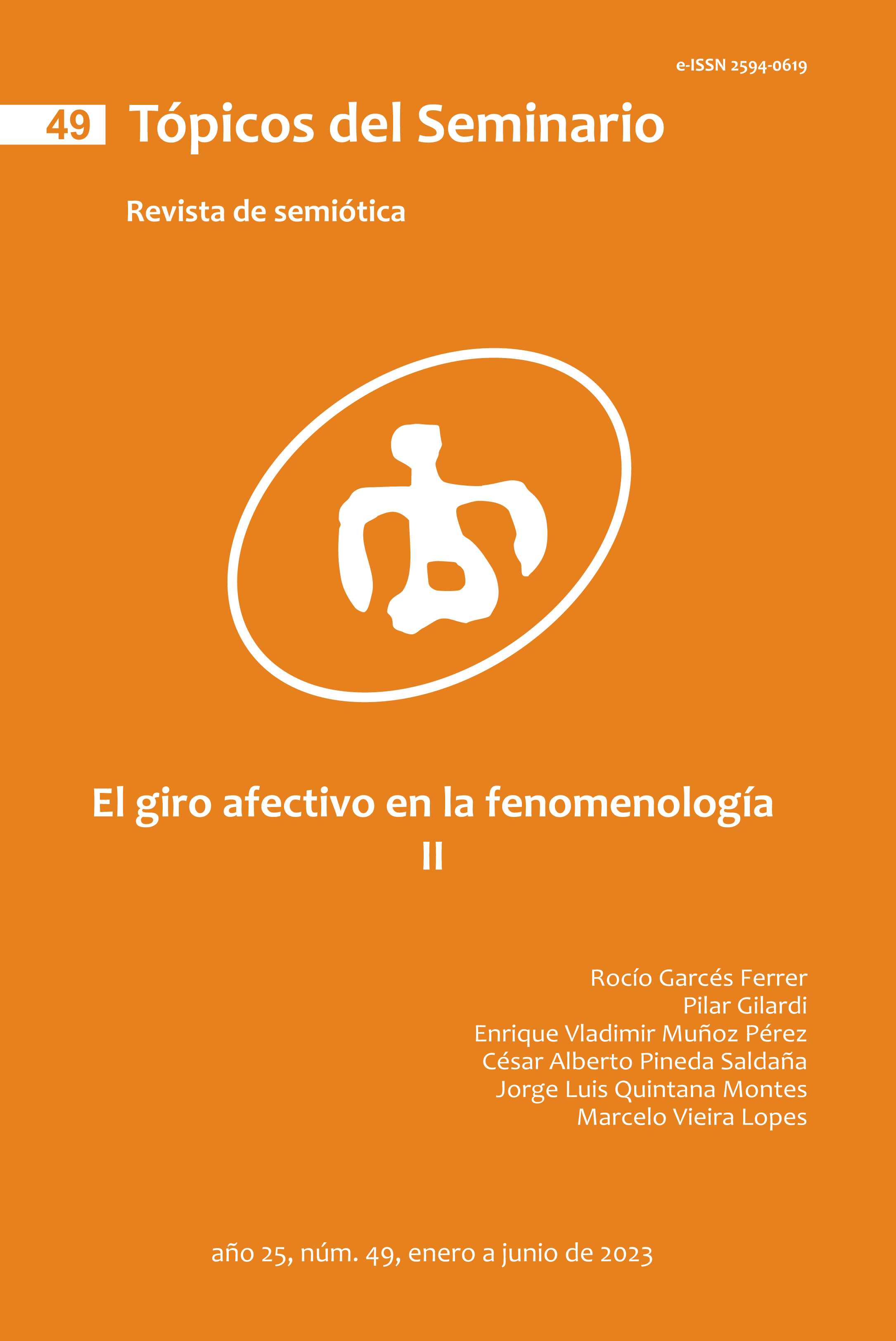De la distinction entre Stimmung et sentiments existentiels : la pertinence pour les cas psychiatriques
DOI :
https://doi.org/10.35494/topsem.2023.1.49.848Mots-clés :
Sentiments existentiels, Heidegger, PsychiatrieRésumé
Des débats récents en philosophie, en psychologie et en sciences cognitives ont souligné le rôle des émotions comme constituant le substrat de base de notre vie affective. La recherche phénoménologique contemporaine, en particulier, a abordé la dimension expérientielle des émotions et leur relation avec les questions ontologiques et taxonomiques. Cet article cherche à contribuer à ce débat en présentant une distinction entre la notion de Stimmung de Heidegger et la notion de sentiments existentiels de Ratcliffe. Comme les Stimmungen de Heidegger, les sentiments existentiels déterminent notre manière de se trouver dans le monde. Dans certains cas, cependant, le monde peut sembler irréel, distant, imprégné d’un profond désespoir. Mon objectif principal est donc de clarifier la relation entre ces catégories descriptives en faisant appel à la description des troubles psychiatriques. Je présente des raisons taxonomiques, conceptuelles et méthodologiques pour distinguer la Stimmung des sentiments existentiels.
Téléchargements
Références
Aho, K. (2009) Heidegger’s Neglect of the Body. Albany. State University of New York Press.
Aho, K. (2019) Contexts of Suffering: A Heideggerian Approach to Psychopathology. London, New York. Rowman and Littlefield International.
Bollnow, O. F. (2017). The Nature of Stimmungen. Philosophia, 45, 1399-1418. DOI: 10.1007/s11406-017-9923-z Carel, H. (2016). The Phenomenology of Illness. Oxford. Oxford University Press.
Cerbone, C. (2000) Heidegger and Dasein’s ‘Bodily Nature’: What is the Hidden Problematic? International Journal of Philosophical Studies, 8, 209-230, DOI: 10.1080/09672550050084018
Drummond, J. (2018). Emotions, value, and action. En Parker, Rodney K.B./Quepons, Ignacio. (Eds.) The New Yearbook for Phenomenology and Phenomenological Philosophy. London. Routledge.
Ferran, Í. (2015). The Emotions in early phenomenology. Studia Phaenomenologica, 15, 349-374.
Freeman, L. (2014). Toward a phenomenology of mood. Southern Journal of Philosophy, 52 (4), 445-476.
Elpidorou, A. & Freeman, L. (2015a). Affectivity in Heidegger I: Moods and Emotions in Being and Time. Philosophy Compass, 10(10), 661-671.
Elpidorou, A. & Freeman, L. (2015b). Affectivity in Heidegger II: Temporality, Boredom, and beyond. Philosophy Compass, 10(10), 672-684.
Fuchs, T. (2013a). The Phenomenology of Affectivity. In: K.W.M. Fulford, Martin Davies, Richard G. T. Gipps, George Graham, John Z. Sadler, Giovanni Stanghellini, Tim Thornton (Eds.). The Oxford Handbook of Philosophy and Psychiatry. Oxford University Press.
Fuchs, T. (2013b). Existential Vulnerability: Toward a Psychopathology of Limit Situation. Psychopathology, DOI: 10.1159/000351838. Goldie, P. (2000). The Emotions: A Philosophical Exploration. New York. Clarendon Press.
Golob, S. (2017). Methodological Anxiety: Heidegger on Moods and Emotions. En Stern, R. & Cohen, A. (Eds.) Thinking about the Emotions: A Philosophical History. Oxford. Oxford University Press. Hadjioannou, C. (2019). Heidegger on Affect. Palgrave Macmillan.
Heidegger, M. (1957). Sein und Zeit. Tübingen. Niemeyer.
Heidegger, M. (1983). Die Grundbegriffe der Metaphysik (GA29/30). Frankfurt am Main. Editorial Vittorio Klostermann.
James, W. (2002). Varieties of Religious Experience: A Study in Human Nature. London and New York. Routledge. [Original publicado en 1902].
Krebs, A. (2017). Stimmung: From Mood to Atmosphere. Philosophia, 45(4), 1419-1436.
Kreuch, G. (2019). Self-feeling: Can self-consciousnnes be understood as feeling? Cham. Springer.
Leder, D. (1990). The Absent Body. Chicago. University of Chicago Press.
Mulhall, S. (1996). Heidegger and Being and Time. Routledge Philosophy GuideBooks. New York: Routledge.
Ratcliffe, M. (2002) Heidegger’s attunement and the neuropsychology of emotion. Phenomenology and the Cognitive Sciences, 1(3), 287-312.
Ratcliffe, M. (2005). The feeling of being. Journal of Consciousness Studies, 12 (8-10), 43-60.
Ratcliffe, M. (2008). Feelings of Being. Phenomenology, Psychiatry and the Sense of Reality. New York. Oxford University Press.
Ratcliffe, M. (2015) Experiences of Depression: A Study in Phenomenology. New York. Oxford University Press.
Ruin, H. (2000). The Passivity of Reason-On Heidegger’s Concept of Stimmung, SATS 1(2), 143-159. Saarinen, J. (2018). A critical examination of existential feeling. Phenomenology and the Cognitive Sciences, 17, 363-374.
Slaby, J & Stephan, A. (2008). Affective intentionality and self-consciousness. Consciousness and Cognition, 17(2), 506-513.
Svenaeus, F. (2018). Why Heideggerian Death Anxiety is not Truly Uncanny: Existential Feelings and Psychiatric Disorders. Discipline filosofiche. XXVIII.
Szanto, T & Landweer, H. (2020). The phenomenology of emotions-above and beyond “What it is Like to Feel”. En Szanto, T.; Landweer, H. (Eds.). The Routledge Handbook of Phenomenology of Emotion. Routledge.
Trigg, D. (2020). The role of atmosphere in shared emotion. Emotion, Space and Society, 35.
Weberman, D. (1996). Heidegger and the disclosive character of the emotions. Southern Journal of Philosophy, 34(3), 379-410.
Withy, K. (2015). Heidegger on Being Uncanny. Cambridge, MA. Harvard University Press.
Téléchargements
Publiée
Comment citer
Numéro
Rubrique
Licence

Tópicos del Seminario is licensed under a Creative Commons Reconocimiento-NoComercial-CompartirIgual 4.0 Internacional License.














